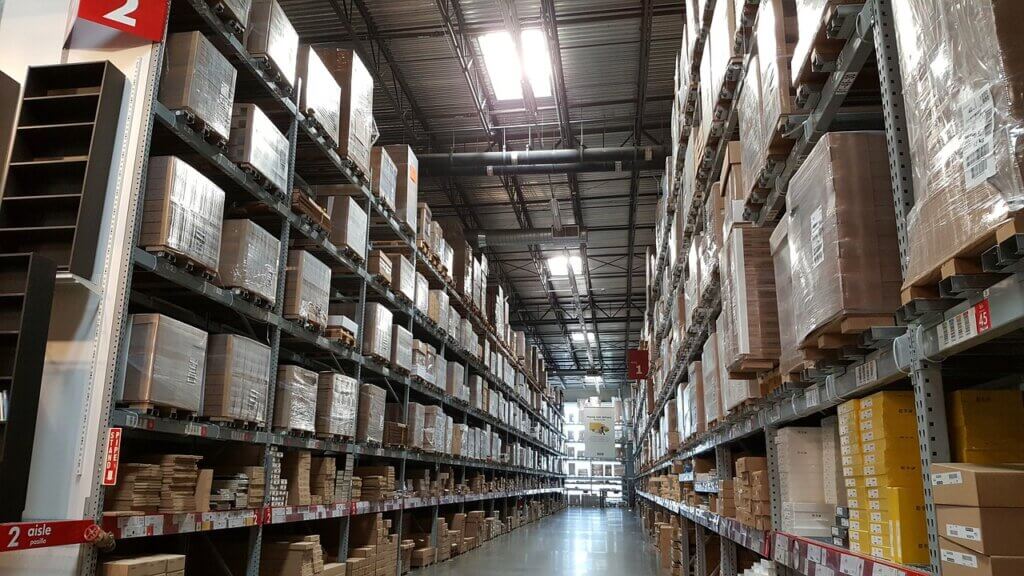Introduction
In the dynamic landscape of commerce, the success of a warehouse business is not solely dependent on operational efficiency and logistical prowess. In an era denoted by digital transformation and online connectivity, effective marketing is crucial for ensuring a warehouse enterprise’s visibility, competitiveness, and sustained growth. This comprehensive guide explores the essential strategies, tools, and considerations in marketing a warehouse business.

Image source: pixabay
Understanding the Unique Challenges and Opportunities
Before diving into marketing strategies, it’s imperative to understand warehouse businesses’ distinctive challenges and opportunities. Often operating in the background of supply chains, warehouses need to communicate their value proposition to potential clients. Key challenges include differentiation from competitors, showcasing technological capabilities, and addressing clients’ diverse needs, ranging from e-commerce giants to small businesses. Given the intricacies involved in marketing a warehousing business, seeking the expertise of a marketing consultant or agency can be a wise investment. These professionals specialize in understanding market dynamics, identifying unique selling propositions, and developing targeted strategies. A marketing consultant can thoroughly analyze the competitive landscape, assess the warehouse’s strengths and weaknesses, and formulate a marketing plan aligning with business goals.
Developing a Strong Brand Identity
Building a robust brand identity is fundamental to successful marketing. A compelling brand communicates what a warehouse does and its values, reliability, and commitment to excellence. This includes designing a memorable logo, crafting a consistent visual language, and developing a compelling brand narrative. The goal is to create an identity that resonates with clients, instills trust, and sets the warehouse apart in a crowded market. Additionally, a well-crafted brand identity should extend beyond visual elements to permeate every aspect of the warehouse’s communication, from website content to customer interactions. Consistency in messaging and brand portrayal fosters a sense of familiarity and reliability among clients. It’s not just about having a logo; it’s about building a brand that becomes synonymous with quality service, innovation, and a customer-centric approach, ultimately influencing the decision-making process of potential clients.
Utilizing Digital Marketing Strategies
Digital marketing strategies can significantly enhance the visibility of a warehouse business. This includes:
- Website Optimization: A user-friendly and informative website is the cornerstone of digital presence. Ensure the website is optimized to rank well in relevant searches.
- Content Marketing: Develop high-quality content that showcases industry expertise, provides valuable insights, and addresses common challenges. This can include blog posts, whitepapers, and case studies.
- Social Media: Share industry news, success stories, and relevant content to build a community around the brand.
- Email Marketing: Implement targeted email campaigns to nurture leads, provide updates, and share valuable content. Personalized and well-timed emails can be powerful tools for maintaining client relationships.
- Pay-Per-Click (PPC) Advertising: Use targeted online advertising to reach specific audiences.
Showcasing Technological Capabilities
In an era of intelligent warehouses and advanced logistics technology, showcasing technological capabilities is a potent marketing strategy. Highlight innovations such as warehouse automation, real-time tracking systems, and data analytics that enhance efficiency and accuracy. These technological advancements attract clients and position the warehouse as a forward-thinking and adaptable partner in the rapidly evolving logistics landscape. Moreover, transparency about these technological advancements builds trust with clients, assuring them of the warehouse’s commitment to staying at the forefront of industry innovation. The warehouse can provide concrete evidence of its value proposition by incorporating case studies or success stories showcasing these technologies’ tangible benefits. In a competitive market, where technological prowess is a differentiator, effectively communicating these capabilities attracts new clients and reinforces existing partnerships.
Building Strategic Partnerships
Collaboration is critical in the logistics industry. Strategic partnerships with other businesses, suppliers, and competitors can amplify marketing efforts. These partnerships can result in shared resources, expanded networks, and mutually beneficial marketing campaigns. A collaborative approach not only enhances the capabilities of a warehouse business but also strengthens its position in the market. Furthermore, beyond the immediate benefits of shared resources, collaborative marketing efforts can lead to a more comprehensive understanding of market trends. By tapping into the networks of strategic partners, a warehouse business can access new client pools and gain valuable insights into emerging opportunities. In an industry where relationships are pivotal, building strategic partnerships becomes a marketing strategy and a foundation for long-term success and resilience in a dynamic logistics landscape.
Embracing Sustainable Practices
Sustainability is no longer just a buzzword; it’s a critical consideration for businesses across industries. Marketing a warehouse as environmentally conscious can resonate with clients who prioritize sustainable practices. This could involve implementing eco-friendly packaging, optimizing transportation routes for fuel efficiency, and adopting energy-efficient warehouse technologies. Communicating these initiatives through marketing channels can.
Furthermore, aligning with sustainable practices goes beyond mere compliance—it reflects a commitment to corporate responsibility and stewardship of the environment. A warehouse attracts environmentally conscious clients by showcasing these initiatives in marketing materials, such as on the company website or in promotional campaigns. It contributes to a broader narrative of corporate citizenship. The emphasis on sustainability positions the warehouse as a responsible player in the industry and resonates with a growing consumer base that values eco-friendly choices and ethical business practices.
Leveraging Customer Testimonials and Case Studies
Develop case studies highlighting successful collaborations, showcasing challenges, and how the warehouse overcame them. Real-world examples can give potential clients valuable insights into the warehouse’s capabilities and reliability. Additionally, customer testimonials and case studies provide tangible evidence of a warehouse’s track record, fostering trust and credibility. When potential clients see positive feedback and practical solutions to challenges, it instills confidence in the warehouse’s ability to meet their unique needs. Actively incorporating these success stories into marketing materials and presentations validates the warehouse’s expertise and serves as persuasive content that can influence decision-making in a competitive market.
Participating in Industry Events
Industry events, trade shows, and conferences bring together professionals, potential clients, and industry influencers. Setting up a booth, sponsoring events, or participating in panel discussions can significantly elevate the visibility of a warehouse business within the industry. Furthermore, participating in industry events lets a warehouse business stay abreast of the latest trends, innovations, and competitor strategies. Networking with professionals and engaging in discussions during panel sessions enhances visibility and positions the warehouse as an active contributor to industry discourse. Beyond the immediate exposure, the relationships forged at these events can lead to valuable collaborations, partnerships, and insights that can shape the warehouse’s future growth and competitiveness.
Implementing Customer Relationship Management (CRM)
A robust CRM system is invaluable for managing customer relationships. It allows for personalized communication, tracks customer interactions, and helps in tailoring marketing efforts to specific client needs. CRM systems also aid in identifying upselling and cross-selling opportunities, enhancing overall client satisfaction and loyalty. Moreover, a well-implemented CRM system provides a centralized customer information database, facilitating a holistic understanding of client preferences and behaviors. By leveraging data insights, the warehouse can anticipate client needs, proactively address concerns, and personalize its services. The ability to identify upselling and cross-selling opportunities not only maximizes revenue streams but also deepens the client’s trust by demonstrating a keen understanding of their evolving requirements. A CRM system is not just a tool; it’s a strategic asset in building enduring and mutually beneficial client relationships.
Staying Informed on Industry Trends
The logistics and warehouse industry is dynamic, constantly emerging new trends and technologies. Staying informed on industry trends is essential for effective marketing. This knowledge allows a warehouse business to position itself as an industry leader, adapting quickly to changes and offering clients cutting-edge solutions. Regularly publishing insights on industry trends can establish the warehouse as a thought leader. Furthermore, staying ahead of industry trends enables a warehouse business to address challenges and capitalize on emerging opportunities proactively. By positioning itself as an industry leader through thought leadership, the warehouse gains credibility and becomes a go-to resource for clients seeking expertise and innovation. Regularly publishing insights through blog posts, webinars, or whitepapers showcases the warehouse’s industry insight and reinforces its commitment to keeping clients informed and prepared for the evolving landscape.
Monitoring and Measuring Marketing Efforts
Marketing is an ongoing process that requires constant evaluation. Implement analytics tools to monitor the performance of various marketing channels: track website traffic, conversion rates, social media engagement, and other relevant metrics. Use the insights gained to refine marketing strategies, focusing on channels and tactics that deliver the best results. Regular assessment ensures that marketing efforts remain aligned with business goals. Additionally, a continuous focus on monitoring and measuring marketing efforts enables a warehouse business to adapt swiftly to changing market dynamics. By leveraging analytics tools, companies can optimize their current strategies and gain valuable insights into shifting consumer behaviors, allowing agile adjustments to stay ahead of the competition and ensure sustained marketing effectiveness.
Adapting to Changing Consumer Behavior
Consumer behavior continually evolves, influenced by technological advancements, economic shifts, and global events. Successful warehouse marketing involves adaptability. Stay attuned to changes in consumer behavior and adjust marketing strategies accordingly. For example, if there is a surge in e-commerce, tailor marketing efforts to highlight the warehouse’s capabilities in servicing online retailers. Furthermore, adapting to changing consumer behavior requires a proactive approach to understanding the evolving needs and preferences of the target audience. By staying attuned to shifts in consumer behavior, a warehouse business can not only align its marketing strategies with current trends but also anticipate future demands. This adaptability positions the warehouse as a responsive and customer-centric partner, capable of navigating the fluid landscape of consumer behavior with agility and effectiveness.
Image source : unsplash
Conclusion
Marketing a warehouse business goes beyond showcasing storage capacity and logistical prowess; it involves crafting a narrative that resonates with clients, building a solid brand identity, and leveraging digital tools to reach a wider audience. In an industry where competition is fierce and technological advancements are rapid, a proactive and strategic approach to marketing is essential for sustained growth. By embracing the strategies outlined in this guide, warehouse businesses can not only navigate the complexities of the modern marketplace but also thrive and position themselves as leaders in the logistics industry.


